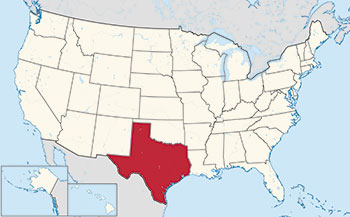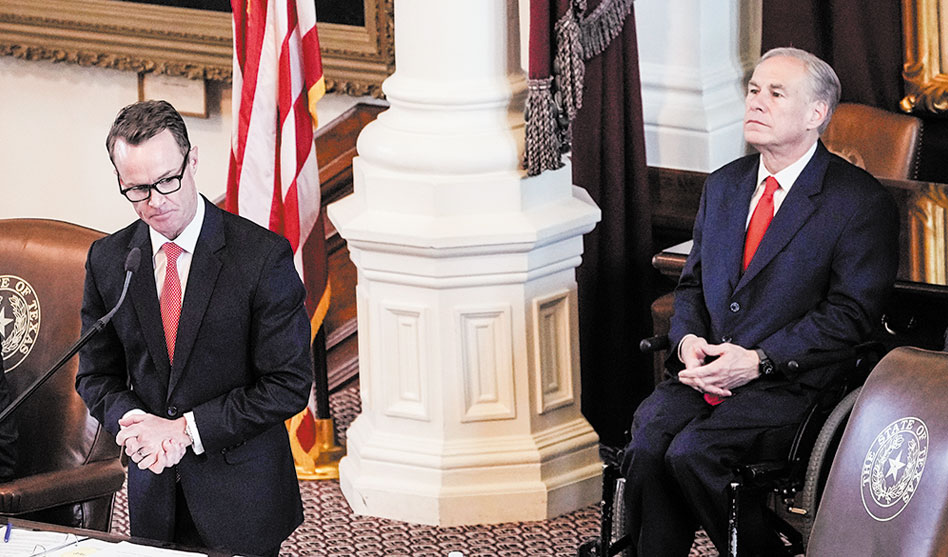Gov. Greg Abbott has pledged to sign several bills coming out of the 88th Texas Legislature that target tranasgender Texans
As Texas anti-LGBTQ legislation reaches boiling point, so do queer homeowners
CAROLINE SAVOIE | Contributing Writer
carosavoiswriting@gmail.com
When Bob McCranie started a website to help LGBTQ Texans flee the state in response to anti-queer legislative agendas, some of his friends thought he was being hyperbolic. But within 60 days of the site going live, McCranie had to expand his resources to meet demand.
That’s when his organization, Flee Texas, turned into Flee Red States.
For the last several years, McCranie said, a common discussion among queer Texans has revolved around the question, “Where are you going?” And he provides a solution. As advancing anti-LGBTQ legislation looms overhead, gay homeowners are jumping ship from the Lone Star State.

Realtor Bob McCranie (Photo by Beau Bumpas-Infante)
“If you eat at a restaurant, and you had horrible food, you would never go back and spend money at that restaurant,” McCranie said.
“You’d find a better restaurant and tell your friends to go there. States should compete for our money like restaurants do. [Texas] needs to treat us better than this, or we’ll take our tax money somewhere else.”
As a longtime Texas resident, gay Realtor and founder of Texas Pride Realty, McCranie provides an avenue to refuge for marginalized folks in Texas and across the country. He started Flee Red States to create a network of LGBTQIA Realtors helping restless homeowners sell their properties in Republican-dominated states.
And, McCranie said, “We’ve seen more families seeking help than ever before, and it’s not hard to understand why.”
Since May 17, five bills targeting marginalized communities in Texas have advanced toward becoming law. Three bills are already on Gov. Greg Abbott’s desk awaiting his signature: Senate Bill 14, which bans gender-affirming health care for transgender minors and require medical staff to take patients off such treatments; Senate Bill 17, which eliminates diversity, equity and inclusion (DEI) departments and projects from Texas’s public colleges; and Senate Bill 12, which would prohibit anyone under 18 years old from attending “sexually oriented” events and expose performers to criminal charges. Yet another bill, one that would ban the instruction on topics of gender identity and sexual orientation in all grades, passed in the Senate on May 23.
McCranie said the legislators are hitting the LGBTQIA community from all angles — medical care, education, athletics, even business.
As an example, he pointed to Pearl Bar, a lesbian bar in Houston that was denied business insurance because it hosts bingo with drag performers.
 Soon to join the others is another piece of legislation that would require college athletes to compete in sports based on the sex on their birth certificate, directly targeting trans adults in the state. This anti-trans bill follows one the state passed in 2021 regarding younger student athletes.
Soon to join the others is another piece of legislation that would require college athletes to compete in sports based on the sex on their birth certificate, directly targeting trans adults in the state. This anti-trans bill follows one the state passed in 2021 regarding younger student athletes.
Charlotte Moellering, a retired schoolteacher and Texas native, said she has a friend with a transgender child who had to put up such a fight to get medical care in Texas that their family decided to move to Arizona.
Moellering said she thought attitudes toward LGBTQ folks in Texas were getting better over the last few years. But, she said, a recent influx of conservative Christian parents are electing school board members to follow their religious-based wishes, prompting anti-queer policies and legislation.
“Wouldn’t it be wonderful to go anywhere and be accepted by everyone?” she questioned. “If we moved, we wouldn’t have to look at the paper every day and see what rights they’re trying to take away from us, or how Christians are trying to use my own Christian faith against me.”
But Moellering said every time she and her wife Diana talk about moving, they come to the same conclusion: Stay in Texas and advocate for their community.
McCranie said there was once hope for queer people in the Lone Star State, but Abbott’s reelection and a rise in anti-gay legislation are now casting a grim shadow.
“As these laws roll out and the full effect is understood, our community will have a fight or flight reaction,” he said. “We continue to find folks in our community who need to or want to get out. Some have no means and are desperate.”
Flee Red States celebrated its one year anniversary in May. The site’s homepage outlines its goals in plain language: “Our marriages, our families and even our safety are at risk. If you feel the need to leave the jurisdiction of a Red State, let us help you sell your property here and connect you with an LGBTQIA+ or ally agent in a better location of your choice.”
McCranie said 25 groups of people have relocated with help from his organization, and he doesn’t foresee demand slowing down. He has gay friends, he said, who left town so quickly, they didn’t have time to say goodbye.
“I don’t blame them,” McCranie acknowledged. “There are people who want to stay and fight, but that isn’t safe for others, especially trans people or families with trans children.”
In May alone, for example, Texas Attorney General Ken Paxton started two investigations into children’s hospitals in Houston and Austin over their gender-affirming treatments for transgender minors. Many of the physicians on staff at Dell Children’s Medical Center in Austin left when Paxton announced his investigation into that facility — although it’s not clear whether leaving was their choice or the choice of administrators. Either way, their absence left many of Dell’s young patients without a doctor.
To those who choose to stay in Texas or some other red state, McCranie says, “Bless your heart.
“There’s always someone who stays during a hurricane,” he said. “But to understand is to evacuate.”
Moellering said the only things keeping her and Diana in the state are their families, their friends and their 11-year-old son. “If it wasn’t for all of them, we’d be in Canada or another state,” she said.
Moellering said when she and Diana fell in love, they were scared to come out to their community, and for good reason. The new pair faced discrimination and derogatory comments from the public, their employers, even the pastor of their church.
“Diana and I didn’t even talk about [our relationship] because we wanted to serve in the church,” she said. “Once we were out, the pastor asked us to leave the church, but we didn’t. We sat in the front pew, right in front of the pastor, every Sunday.”
Now, Moellering said, she and her wife are taking the same approach when it comes to their state legislature. “We have deep roots here,” she said. “We’ve decided we can stay and fight and try to make a difference.”
They’ve spoken at Carrollton City Council meetings, partnered with The Trevor Project, spoken at P-FLAG meetings and attended demonstrations against discriminatory policies. Moellering said she supports McCranie’s movement to help people relocate. But, she noted, it’s a privilege granted to those who are able to not only uproot their jobs, lives and families, but can also afford the costs of moving.
There are many who don’t have that privilege.
When Moellering’s son returned from school and asked her how to respond to his peers making fun of his moms, she reassured him: “We’re legal, we’re perfectly normal, and we have a right to be here,” she said.


Thank you for covering this migration. Most of my friends are making plans to get out.
This is dumb. Stay and fight. Remember that we have to keep the Senate from going deep red, otherwise all our rights are gone nationally. Then you’re gonna have to flee the US.
Also shame on you for making money on people’s misfortune. Very un-Christian